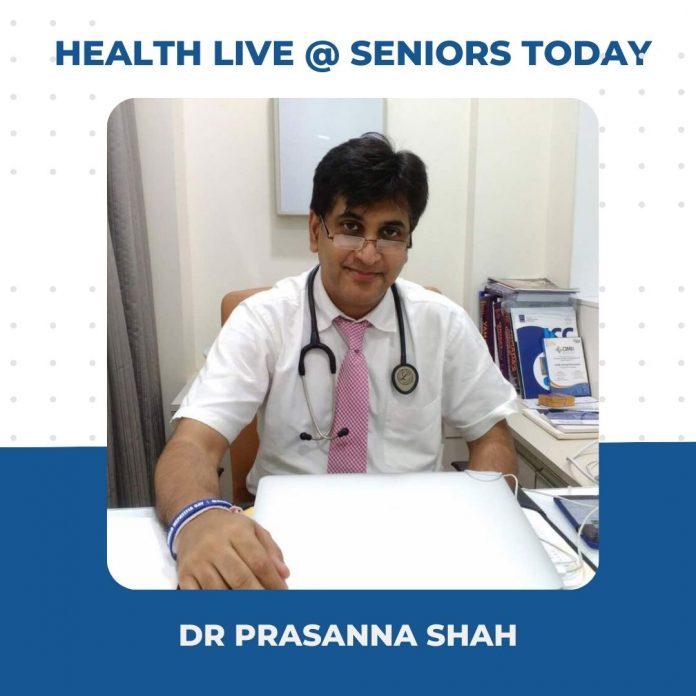On Sat, May 15,we at Seniors Today hosted our weekly Health Live session where we had with us a Leading Gastroenterologist- Dr Prasanna Shah who answered questions on Excessive Gas and Ways to Ease Discomfort.
Dr. Prasanna Shah is a leading Consultant Interventional Gastroenterologist and is attached to the Breach Candy, Jaslok and Saifee Hospitals in Mumbai. He has vast experience in therapeutic endoscopy and more recently metabolic correction endoscopy for weight loss.
Some patients with covid, present with GI manifestations such as acute pain abdomen, chronic pain in the abdomen, develop pancreatitis. But flatulence is not a manifestation of the disease, it is due to the antibiotics given to control the disease that causes it. The antibiotics kill the good bacteria in the colon and produce a lot of gas once the good bacteria is gone.
Causes of excess gas:
- We swallow a lot of air, while drinking water or eating- you either pass these as gas or burps.
- Eating too fast- while doing this you swallow a lot of air and also uncrushed and undigested food enters the colon where the bacteria ferments it and releases nitrous gas, methane that gives a pungent odour to the flatulence.
- Drinking too fast
- Drinking excessive carbonated drinks
- Patients with diabetes or thyroid disorders
- Lactose intolerance
- Celiac disease
- Small intestinal bacterial overgrowth (SIBO)
- Consuming a lot of fruits, vegetables and pulses such as- daal, rajma, cauliflower, broccoli, cabbage, sprouts
Patients suffering from Obstructive Sleep Apnoea (OSA) tend to pass a lot of gas in the form of burps or farts after getting up from a nap or a night’s sleep due to mouth breathing by ingesting and swallowing a lot of air while sleeping. OSA is one of the most common causes of burps in the morning or passing the wind at night.
There is a common linkage between the gallbladder stones and gas. You do not have to get the gall bladder stones removed unless they are symptomatic and should be looked into only if they are causing jaundice, fever, pain and a rim of fluid around the gallbladder (pericholecystic fluid). You can develop a lot of gas following the removal of the gallbladder, primarily attributed to the weakening of your digestive system. If your diet following the surgery constitutes fats, it can lead to fat indigestion. Dr. Shah advises at least 6-12 weeks of a fat free diet post-cholecystectomy.
Chronic constipation is a common condition that can produce a lot of gas. You need to treat your constipation to treat your flatulence.
On an average we pass wind 14-15 times a day, it is more in men and less in women.
Sweets, which have fructose or sorbitol produce gas, it is important that you avoid it. If you really want to have it, have it during the day. Avoid having sweets in the night.
Allergies can come at any given point in time, including food allergies. Dr. Shah advises to take away all the items you suspect you might be allergic to from your diet for at least 6 months to 1 year and then slowly introduce one item at a time at a gap of 4-6 weeks and see how you respond to it.
Isabgol is a good natural laxative which should be consumed on a daily basis. It can be taken with water, dahi, lassi, etc.
Blood thinners or painkillers are some medications which can cause excessive gas production.
Endoscopy nowadays is a painless, short, OPD procedure. You will be administered a short acting local anesthetic. It is a procedure that can give you a lot of information.
If you have an altered bowel habit or weight loss or blood in your stools, you immediately need to get yourself investigated because that can be an early sign of cancer or a cancer being formed.
Dr. Shah says that there is no study suggesting when is the best time to consume fruits or water, etc. he says that you need to consume 8-10 glasses of water a day. He also says that it is best if you eat your fruits before the meal because there are certain fruits you might not be able to tolerate after a meal, for example, citrus fruits- oranges, pineapple,etc.
Whatever fruits you consume, have them in moderation. You can have fruits for a meal but avoid citrus fruits for the same. You should add papaya (good stool softener), banana (good source of potassium) to it.
Apples are constipating
Lemons, grapes, oranges can be acidic
Have a well balanced fruit bowl
If you have salads for meals, make sure you shred the vegetables into small, chewable and digestible pieces. Some people digest salads extremely well while others don’t
Intermittent fasting is shown to be good if you’re fasting between 12-16 hours. This brings down your weight, once your weight comes down your diabetes, blood pressure, thyroid, everything comes around. You will cardiomebatolocally get better if you fast intermittently for 16 hours.
Diarrhoea/ loose motions: (def.) when you pass 4-5 loose stools of variable quantities per day.
Constipation: (def.) you have one spontaneous bowel movement in 2-3 days.
How often should one get a screening colonoscopy?
The guidelines say- at 50, get a colonoscopy done. If normal, get the next one at 60 years of age and then at 65.
If a polyp is found, depending upon the type of the poly the screening time is variable
If you get it done after 60 years, you can follow up every 3 years.
Dr. Prasanna Shah can be reached Monday through Friday, 3-6 PM at Tel: 022-23676598/83. He can also be reached at drpssshah@yahoo.co.in








